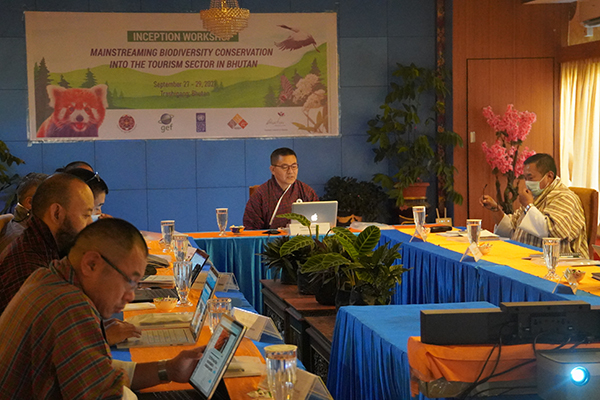 To promote Bhutan as a model eco-tourism destination, the Tourism Council of Bhutan (TCB) launched the ecotourism project in Trashigang. The project “Mainstreaming Biodiversity Conservation into the Tourism Sector in Bhutan” was launched coinciding with the World Tourism Day today.
To promote Bhutan as a model eco-tourism destination, the Tourism Council of Bhutan (TCB) launched the ecotourism project in Trashigang. The project “Mainstreaming Biodiversity Conservation into the Tourism Sector in Bhutan” was launched coinciding with the World Tourism Day today.
The project will be implemented as part of the Tourism Flagship Programme over a period of five years. It will cover biodiversity conservation in Sakteng wildlife sanctuary, Boomdeling wildlife sanctuary and five Dzongkhags of Lhuntse, Monggar, Trashigang, Trashi Yangtse and Zhemgang.
“This ecotourism project is part of overall tourism flagship programme approved by the Royal Government of Bhutan, and through this project, we seek to conserve biodiversity conservation into tourism sector as a long term for the mitigation of biodiversity and to aim to promote Bhutan as a model of eco-tourism,” said Tashi Tenzin, the Project Manager at the TCB.
Stakeholders and development partners including the United Nations Development Programme are attending the three-day inception workshop in Trashigang.
UNDP Resident Representative Azusa Kubota said as a world leader in nature conservation and climate action, Bhutan can be “a pioneer in rebuilding tourism for the future”.
“In a world where solitude, pristine environment and clean air have become rare commodities, Bhutan must tap into its ecotourism potential. And this should be the centrepiece of tourism recovery from COVID-19, engaging communities as direct beneficiaries, and the TCB’s vision of Taking Tourism to the Top,” she said.
The Director-General of the TCB, Dorji Dhradhul said, “(this) project which is focused on eco-tourism is about “inclusive growth”-inclusive in terms of stakeholders-viz: human, wildlife, environment, and cultural landscapes as partners, and inclusive in terms of generations – the present and future generation.”
The project worth USD 4.854 million, funded by Global Environmental Facility, is expected to bring about positive changes in the rural areas by promoting a wildlife-based economy, boosting domestic tourism, creating employment opportunities and increasing community resilience and connection to nature.
Sonam Darjay, Trashigang
Edited by Sonam





